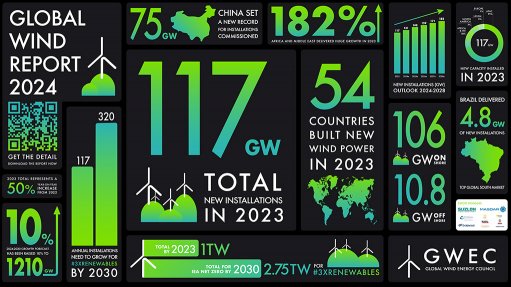Sustainable partnerships needed to ensure Africa’s food security


WESSEL LEMMER Achieving sustainable food security for urban and rural citizens remains an important priority for governments across Africa
New approaches and sustainable partnerships are required to ensure food security for Africa’s rapidly urbanising population, says financial services provider Absa senior agricultural economist Wessel Lemmer.
According to a January 2017 report by The Sustainable Development Goals Centre for Africa, the continent boasts 65% of the world’s arable land and food demand is expected to rise by more than 60% by 2050, owing to population growth.
Lemmer points out that the continent’s expected population growth might cause its food security challenges to become a chronic issue, particularly owing to challenges of insufficient property rights, agricultural investment and policy, as well as regulatory uncertainty that leads to escalating food prices. “Achieving sustainable food security for urban and rural citizens remains an important priority for governments across the continent.”
Food security requires a balance between availability and affordability, as well as coordinated partnerships among stakeholders in the agriculture sector, he notes, adding that exploring innovative approaches to farming is becoming increasingly important.
One such innovation, urban agriculture, is “considered to be on the cusp of advancements within the sector” and might be a significant contributor to sustainable access to nutritious food sources in the future, says Lemmer.
“Simple shifts can result in better efficiencies and environment-friendly produce that are less prone to climatic changes and which ultimately have a positive influence on production yields.”
He adds that community gardens and cooperatives can also play a key role in supplementing household budgets and, more importantly, in adding a wider range of vitamins and minerals to consumers’ diets.
With half of Africa’s population under the age of 25, of which 72% will seek employment opportunities, Lemmer asserts that agriculture can be a key contributor to not only job creation for unemployed youth but also to economic development on the continent. “These statistics are only set to grow,” he says, noting that, in the next 20 years, more than 330-million Africans are expected to enter the job market.
Meanwhile, he points out that countries such as Nigeria have moved towards a more intensified and commercialised product system to cope with growing food demand. Lemmer says the shift from traditional to modern farming methods has been assisted through the increased adoption of modern systems and irrigation, as well as genetically modified seed and fertiliser inputs.
Production research is another avenue through which African nations can alleviate crop and livestock vulnerability, which needs greater investment from many countries on the continent, he notes.
South Africa is the continent’s most developed and profitable agricultural producer, boasting a capital-intensive and export-orientated agriculture sector typified by large-scale commercial operations that cover about 86% of the cropland.
“However, South Africa’s agriculture sector is also taking strain from insufficient investment in agricultural infrastructure, research and development, as well as education and training programmes, particularly for farmers who are starting out,” he says.
Lemmer notes that, while Africa has made significant strides through innovations in financial payments and telecommunications, the continent is yet to realise its potential to provide grains and proteins for its citizens and those in other parts of the world.
“If agriculture is to improve its contribution to economic development and the achievement of sustainable and secure food supply systems on the continent, key stakeholders have to be much more coordinated in their partnerships within not only countries but also the various regions,” he concludes.
Comments
Press Office
Announcements
What's On
Subscribe to improve your user experience...
Option 1 (equivalent of R125 a month):
Receive a weekly copy of Creamer Media's Engineering News & Mining Weekly magazine
(print copy for those in South Africa and e-magazine for those outside of South Africa)
Receive daily email newsletters
Access to full search results
Access archive of magazine back copies
Access to Projects in Progress
Access to ONE Research Report of your choice in PDF format
Option 2 (equivalent of R375 a month):
All benefits from Option 1
PLUS
Access to Creamer Media's Research Channel Africa for ALL Research Reports, in PDF format, on various industrial and mining sectors
including Electricity; Water; Energy Transition; Hydrogen; Roads, Rail and Ports; Coal; Gold; Platinum; Battery Metals; etc.
Already a subscriber?
Forgotten your password?
Receive weekly copy of Creamer Media's Engineering News & Mining Weekly magazine (print copy for those in South Africa and e-magazine for those outside of South Africa)
➕
Recieve daily email newsletters
➕
Access to full search results
➕
Access archive of magazine back copies
➕
Access to Projects in Progress
➕
Access to ONE Research Report of your choice in PDF format
RESEARCH CHANNEL AFRICA
R4500 (equivalent of R375 a month)
SUBSCRIBEAll benefits from Option 1
➕
Access to Creamer Media's Research Channel Africa for ALL Research Reports on various industrial and mining sectors, in PDF format, including on:
Electricity
➕
Water
➕
Energy Transition
➕
Hydrogen
➕
Roads, Rail and Ports
➕
Coal
➕
Gold
➕
Platinum
➕
Battery Metals
➕
etc.
Receive all benefits from Option 1 or Option 2 delivered to numerous people at your company
➕
Multiple User names and Passwords for simultaneous log-ins
➕
Intranet integration access to all in your organisation



















